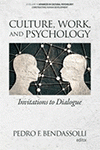
Culture, Work and Psychology
Invitations to Dialogue
Edited by:
Pedro F. Bendassolli, Universidade Federal do Rio Grande do Norte, Natal/Brazil
A volume in the series: Advances in Cultural Psychology: Constructing Human Development. Editor(s): Jaan Valsiner, Niels Bohr Professor of Cultural Psychology, Aalborg University.
Published 2019
This books arises from the observation that mainstream psychology, especially work and organisational psychology (WOP), suffers from critical limitations in its attempts to deal with the complexities of work as a cultural phenomenon. We can only mention a few examples here. In the WOP field, especially in Anglo- Saxon tradition, work experiences are seen through the lenses of traditional behavioural approaches, whereas culture is seen as a ‘software of the mind’, to use a popular definition found in this field (based on cross-cultural mainstream psychology). ‘Competences’, to take another example, are thought of as something that do or do not people have inside them. Suffering, like stress (a common work-based problem of our times), is considered to be dependent on a person’s personality, perceptions or as a set of behaviours triggered by facing an ‘objective’ environment. Even meaning-making process can be found to be defined from a WOP mainstream point of view: meanings are ‘social cognitions’ shared by people by means of unidirectional socialisation processes.
Therefore, the goal of this book is to deliver to the reader a new and challenging theoretical and methodological tool box, inspired by insights developed from a broad cultural psychological perspective. Its focus is on the consideration of work and organisations based on core concepts developed inside cultural psychology. Therefore, it is designed to discuss potential extensions of these concepts to work psychology.
CONTENTS
Series Editor’s Preface: Work as a Very Strange Invention. PART I. Work as a Cultural Phenomenon: Contributions to the Dialogue Between Psychology, Work, and Culture, Pedro Bendassolli and Sonia Gondim. Looking Back to Look Forward: A Working History of Cultural Psychology, Kevin R. Carriere. PART II. Conceiving Work as (an) Activity: Epistemological Underpinnings From a Cultural-Historical Perspective, Patricia Dionne and Alfredo Jornet. Vygotsky and Work: An Activity Clinic to Change the Organization, Antoine Bonnemain, Jean-Yves Bonnefond, Flavio Fontes, and Yves Clot. PART III. Once I Imagined to Work: A Short Drama in Two Acts and Two Intermezzos About the Semiotic Dynamics of a Job Center, Luca Tateo and Morten Bech Kristensen. Borders at Work: The Minimum Power Management Position, Giuseppina Marsico. Cultural Psychology and Employment of Youth With Psychic and Social Problems, Diana Nellemann S. Andersen, and Mogens Jensen. Ruptures and Transitions in Work Paths: Uses of Normative Fields in the Life Course, Maija Korhonen, Tania Zittoun, and Katri Komulainen. Work and Geographical Mobility: The Case of the Male Accompanying Spouses, Flavia Cangià, Tania Zittoun, and Deborah Levitan. Organizational Creativity From a Situated and Cultural Psychological Perspective, Lene Tanggaard. Mobilization of Adult Learners in Educative Program: Bergson, Vygotsky, and Beyond, Dany Boulanger and Patricia Dionne. Work, Collaboration, and Adult Development on a Digital Platform for Permanent Education Within the Brazilian Unified Health System (SUS): A Cultural- Semiotic Approach, Maria Cláudia Santos Lopes de Oliveira and Caroline Zamboni de Souza. Models of Value Construction: For a Semio-Dialectical Approach to Organization and Social Action, Sergio Salvatore, Alessandro Gennaro, Ada Manfreda, and Sara Calogiuri. Processes of Modal Articulation: Extending a Semiotic and Psychodynamic Model of Sensemaking, Raffaele De Luca Picione. Self-Fulfillment: The Work of Human Existence, Sigmar Malvezzi. Public’s Social Representations of Relational Professions and Their Work Context: Extension of Moscovici’s Study in the New Public Management, Dany Boulanger.
-
Paperback978-1-64113-632-7
Web price: $45.04 (Reg. 52.99)
-
Hardcover978-1-64113-633-4
Web price: $80.74 (Reg. 94.99)
- eBook978-1-64113-634-1

- PSY021000 - PSYCHOLOGY: Industrial & Organizational Psychology
- PSY023000 - PSYCHOLOGY: Personality
- PSY040000 - PSYCHOLOGY: Experimental Psychology
-
 Cultural Psychology of Intervention in the Globalized World
Cultural Psychology of Intervention in the Globalized World
-
 Deep Loyalties
Values in Military Lives
Deep Loyalties
Values in Military Lives
-
 Drama of Multilingualism
Literature Review and Liberation
Drama of Multilingualism
Literature Review and Liberation
-
 From Dream to Action
Imagination and (Im)Possible Futures
From Dream to Action
Imagination and (Im)Possible Futures
-
 Home in Transition
The Cultural Construction of Heimat
Home in Transition
The Cultural Construction of Heimat
-
 Making of Distinctions
Towards a Social Science of Inclusive Oppositions
Making of Distinctions
Towards a Social Science of Inclusive Oppositions
-
 Ornamented Lives
Ornamented Lives

